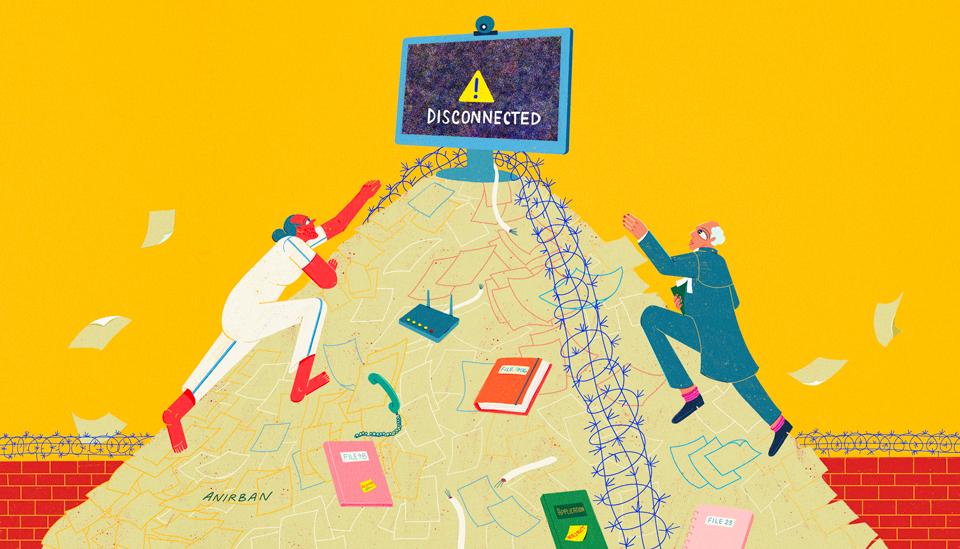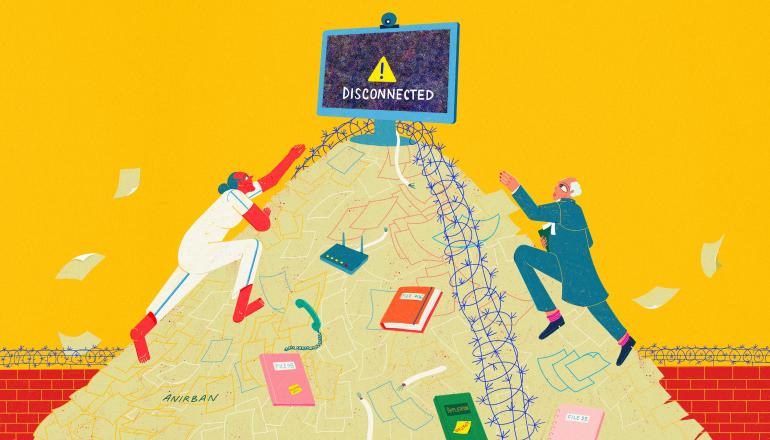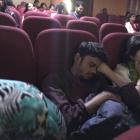
Image description: Undertrial prisoner reaching towards computer screen showing Disconnected Symbol; on the other side of the computer is a lawyer also reaching towards screen. Art by Anirban Ghosh.
Talking about the migration of labourers that took place in India due to the lockdown Ammi (my mother) said that, "The nationwide lockdown was declared in India on 24 March and since then we as a country have failed our people who live on the margins."
The complete restriction on movement has got everyone checking up on their friends and family but there are people who have not been able to contact their families or friends.
"The nationwide lockdown was declared in India on 24 March and since then we as a country have failed our people who live on the margins."
Around the world, more than 10.35 million people are imprisoned either as pre-trial detainees or having been convicted and sentenced according to a U.K based institution of criminal policy research. Out of the 10.35 million inmates, India has about 4,66,084 (National Crime Records Bureau, 2018) inmates of which 69.4 per cent are pre-trial detainees. This means out of the 4,66,084 inmates 3,23,462 inmates are people serving time for crimes that are yet to be judged.
The prison authorities around the globe have suspended the prison visiting system which was in place for inmates to meet their biological families and lawyers. As the virus spread vehemently around the planet, concerned authorities were forced to opt for alternatives.
Prison authorities in the Asian countries as well as all over the globe have restricted inmates' contact with the outside world to break the chain. Thailand prison administration ordered the suspension of all family visits from 18 to 31 March 2020. Confirmed cases among the prisoners against a total of 3,77,722 inmates were 42. Srilankan Prison authorities suspended inmates' contact with the outside world first on 20th March and again on 8 July.
Now, if we go back to the numbers of inmates versus the total capacity of the prisons, we find that our prisons are more than heavily crowded. According to the figures provided by the Government in Rajya Sabha, 2018, India’s 1412 jails are crowded to 114% of their capacity, with a count of 4.33 lakh prisoners against the capacity of 3.81 lakh until December 31, 2016. The numbers have only gone up in the last four years. To decongest the prisons Indian Supreme Court issued orders that State governments should consider releasing undertrials followed by the launching of the E-Mulaqat (translates as e-visits or online visits) website by the management of Rajasthan Prison on 2 April 2020.
The online platform allows prisoner’s families to book meetings in the visiting rooms or carry out video conference calls. Since the physical meetings were/are suspended the introduction of video calls came as a relief to the inmates and their families. On 30th June the prison authorities of Delhi announced that all prisons would be provided with video conference equipment. There are 18 women jails in India comprising a little more than maybe one per cent of the total prisons in India.
Dal Singh Sarai quarantine jail facility for women in India had two such interesting people Tanmay Nivedita and Kalyani, activists who shared their experience for the period they were put into the facility.
In their words
“We were told that Mulaqat was suspended but we could do E-Mulaqat. So, we checked the website eprisons.nic.in and primarily we had to fill a form which was in English and our request was denied multiple times. This was the time when we were out of prison and had to meet a queer person who was inside. We tried different internet connections and devices to rule out the possibilities of bad weather and network, none of which worked. Weeks later when we were put into the same facility, we met our person inside.
This was the time when we were out of prison and had to meet a queer person who was inside. We tried different internet connections and devices to rule out the possibilities of bad weather and network, none of which worked.
We also figured out that the regular phone calls once a week were not happening. The phone line had been out of connection for many months and it didn't seem like that it was going to be fixed anytime soon. The authorities in response were saying that because of COVID-19 they can't find somebody who can fix this problem. We think there wasn't any intention or will to fix the problem. The intensity with which people needed to talk to their families was not seen by the administration as urgent. When we registered for E-Mulaqat from the inside they said we were the first people who had asked for the facility. When the register was being checked there were approximately 100 requests. We think it was the first time they opened the register. We are sure if they had searched with the right intention, we would have found our registration forms pending as well. The reason they came up with the situation was that they said - Unless somebody from the inside asks for E-Mulaqat we cannot approve requests on our own. The inmates inside are unaware of their rights and policies for their aid.
Of Asian countries, China, India and Thailand have the largest numbers of people in confinement. China and India have the largest population and prison population in the region, the former being the epicentre of the pandemic have in some ways dealt with the problem of overcrowding by not giving the exact figures of its inmates. The latter is no exception. Not saying the Indian state hides the concerned data but because the Indian state is too lazy to keep and maintain the data and the standards when it comes to people of caste and gender (sic).”
One interesting thing to note here is the population that forms the majority in the prisons is primarily marginalised from different religions, caste, and gender whose literacy rate is low. National Prisons Information Portal (NPIP) is the online platform for the registration of E-Mulaqat and Mulaqat uses English as a medium to fill out the registration form. The use of English in registering leaves out people who are not familiar with the language.
The use of English in registering leaves out people who are not familiar with the language.
Even though the Delhi prison authorities announced about the E-Mulaqat system the information has not been received by the local prison authorities on district and sub-district level jails.
“The situation now is that the authorities themselves don’t know that there is a system in place known as the E-Mulaqat. The awareness around the policy has been neglected and since many inmates don’t know about it does it really serve its purpose?” asked an anonymous source.
Another criticism about the system in place is that technically it is only for blood relatives, relatives through marriage and lawyers. How intersectional is the platform then for minorities who belong to different genders that are there, or for people who choose their families?
As of this moment, India has confirmed 2,660 cases amongst Indian prisoners. With inmates more than the said capacities of the prisons, are we not awaiting a disaster?
Forgotten population
Prisons both in UP and Bihar display an image of complete neglect. There are eight central, 32 districts and 18 sub-jails in Bihar. All the 58 jails in Bihar are overcrowded with prisoners. Alcohol ban in the state has sent almost 35,000 people to the prisons under the liquor law in the state since 2016.
Putting people behind bars without successfully conducting a trial does not make a state crime-free. And when your prisons are overcrowded with almost 70% of the total population "still-awaiting-a-fair-trial", what does not make sense here is why the actively ignores the plight of the marginalised.
With the continuing suspension of the Mulaqat system and extension of the lockdown, the E -Mulaqat is the one and the only alternative left for the inmates to contact their loved ones in the outside world. The problem of people not being able to access the form is clearly seen as their problem. The state does not have a problem whether an inmate is able to connect to his or her family or not, but the state "cares" only when it comes to the sentiments of the prisoners who belong to a certain (read upper) caste or speak a certain language.
Awareness of any new policy or a bill is as necessary as the bill or the policy itself. One jail said that they only process requests when inmates tell them to do so. How would any inmate know that there is a new policy that has been passed? What do the other jails around the world say or do when it comes to the needs of inmates? Do they also give the same excuse, or do they take a course of action and fix a broken phone line? Wouldn’t it be easy to just not give a damn about what a prisoner might need because firstly they are prisoners, and secondly the chances of them belonging to a marginalised community are relatively much higher? Thirdly, when has the Indian state or the world cared about the needs of the marginalised? From what I know of this country’s history there is not a single instance that comes to my mind.
The final question that I leave you with - is whose job is it to tell the prisoners and pre-trial detainees that they have rights too?

Image description: Undertrial prisoner reaching towards computer screen showing Disconnected Symbol. Original artwork by Anirban Ghosh.
Responses to this post
It is the government's job to inform the prisoners and pre-trial detainees about their rights. Unless the person of the highest rank in the government does it's job rightly, officials of lower rank can't help.
- Add new comment
- 3909 views







Add new comment